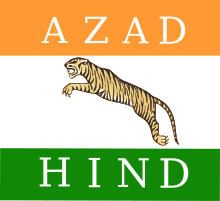Shah Nawaz Khan (general)
Shah Nawaz Khan (24 January 1914 – 9 December 1983) was an Indian politician who served as an officer in the Indian National Army during World War II. After the war, he was tried, convicted for treason, and sentenced to death in a public court-martial carried out by the British Indian Army. The sentence was commuted by the Commander-in-chief of the Indian Army following unrest and protests in India.
The Second World War and the Indian National Army
Khan, who rose to the rank of Captain in the Indian Army,[1] was captured by the Japanese after the fall of Singapore in 1942. A prisoner of war in Singapore, he was profoundly influenced by Subhas Chandra Bose's speeches asking POWs to join the Indian National Army and to fight for a free India.[2] He later stated:[2]
"It will not be wrong to say that I was hypnotized by his personality and his speeches. He placed the true picture of India before us and for the first time in my life I saw India, through the eyes of an Indian."
Impressed by Bose’s patriotic speeches, Nawaz joined the INA in 1943. He was included in the Cabinet of the Arzi Hukumat-e- Azad Hind (INA) formed by Bose. Later, Bose decided to select a regiment consisting of the cream of the INA and send it to action to spearhead the advance into India. Khan led the army into North-Eastern India, seizing Kohima and Imphal which were held briefly by the INA under the authority of the Japanese.[1] In December 1944, Shah Nawaz Khan was appointed Commander of the 1st Division at Mandalay.
INA Trials
Khan was tried, along with General Prem Sehgal and Colonel Gurbaksh Singh Dhillon, for "waging war against the King Emperor" in a public court martial at the Red Fort in Delhi. They were defended by Sir Tej Bahadur Sapru, Jawaharlal Nehru, Asaf Ali, Bhulabhai Desai, Kailash Nath Katju and others based on the defence that they should be treated as prisoners of war as they were not paid mercenaries but bona fide soldiers of a legal government, the Provisional Government of Free India, or the Arzi Hukumat-e-Azad Hind, "however misinformed or otherwise they had been in their notion of patriotic duty towards their country" and as such they recognized the free Indian state as their sovereign and not the British sovereign.[3] During the trial, Khan cited the differential treatment meted out to Indian versus British soldiers in the Indian Army. In his testimony, Khan testified that no Indian officers were given the command of a division and only one was allowed to command a Brigade.[4] Khan was given the death sentence by the court but that sentence was reduced to cashiering by the Commander-in-Chief of the Indian Army.[5]
Political career
After the trial, Khan declared that he would henceforth follow the path of non-violence espoused by Gandhi and he joined the Congress party.[4] Having successfully contested the first Lok Sabha in 1952 from Meerut, Khan had an illustrious parliamentary career becoming:
- The Parliamentary Secretary and Deputy Minister of Railway and Transport for 11 years (1952–1956) & (1957–1964 (second term))
- Minister of Food & Agriculture (1965)
- Minister of Labour, Employment & Rehabilitation (1966)
- Minister of Steel & Mines and Minister of Petroleum & Chemical Industries (1971–1973)
- Minister of Agriculture & Irrigation(1974–1975)
- Minister of Agriculture & Irrigation (1975–1977)
- Chairman of National Seeds Corporation Ltd.
- Chairman, Food Corporation of India.
He was elected four times to the Lok Sabha from Meerut constituency in 1951, 1957, 1962 and 1971. He lost in the 1967 and 1977 Lok Sabha election from Meerut. During the 1965 war, his son Mahmud was a Pakistan Army Officer and the opposition demanded he be removed from the government. But Lal Bahadur Shastri, as Prime Minister, refused to accede and reminded them of his selfless service to India as an Officer of the INA.
Khan's political views were leftist, supporting land reforms and public distribution. But his support for permanent separate personal laws for religious communities led to his defeat in the 1967 elections against Jan Sangh. In 1969, the Indian National Congress split, leading him to side with Indira Gandhi. The 1971 "Gareebi Hatao" campaign brought him again as MP from Meerut. In 1977, the Janata Party led to his defeat and ended his career in Parliament. He remained as head of Congress Sewa Dal till his death.
Shahnawaz Committee
In 1956, the government constituted a committee to look into the circumstances around Subhas Chandra Bose's death with Khan as the head. The committee included Bose's elder brother Suresh Chandra Bose. The Committee began its work in April 1956 and concluded four months later when two out of the three members (excluding Suresh Chandra Bose) concluded that Bose had died in the airplane crash at Taihoku (Japanese for Taipei) in Formosa (now Taiwan), on 18 August 1945. They stated that his ashes were kept in Japan's Renkoji Temple and should be reinstated to India.
In Popular Culture
In the 2005 movie Netaji Subhas Chandra Bose: The Forgotten Hero, Khan was portrayed by actor Sonu Sood.
References
- 1 2 https://books.google.com/books?id=pcKMD9XWyjAC&pg=SA9-PA11&lpg=SA9-PA11&dq=shah+nawaz+khan+captain&source=bl&ots=D4qErtpjfZ&sig=mSAt7GHRYTp9pUwR6xHz9lq40CU&hl=en&sa=X&ei=gGqNUtGEK9S2sATx5oDgBQ&ved=0CGQQ6AEwDQ#v=onepage&q=shah%20nawaz%20khan%20captain&f=false
- 1 2 The INA Trial and The Raj (2003), Harkirat Singh, Atlantic Publishers & Dist, ISBN 9788126903160, p. 26
- ↑ A Hundred Horizons, Sugata Bose, 2006 USA, p136
- 1 2 Cohen, Stephen (Winter 1963). "Subhas Chandra Bose and the Indian National Army". Pacific Affairs. 36 (4): 411–429. doi:10.2307/2754686. JSTOR 2754686.
- ↑ Green, L.C. (January 1948). "The Indian National Army Trials". The Modern Law Review. 11 (4): 47–69. doi:10.1111/j.1468-2230.1948.tb00071.x. JSTOR 1090088.
